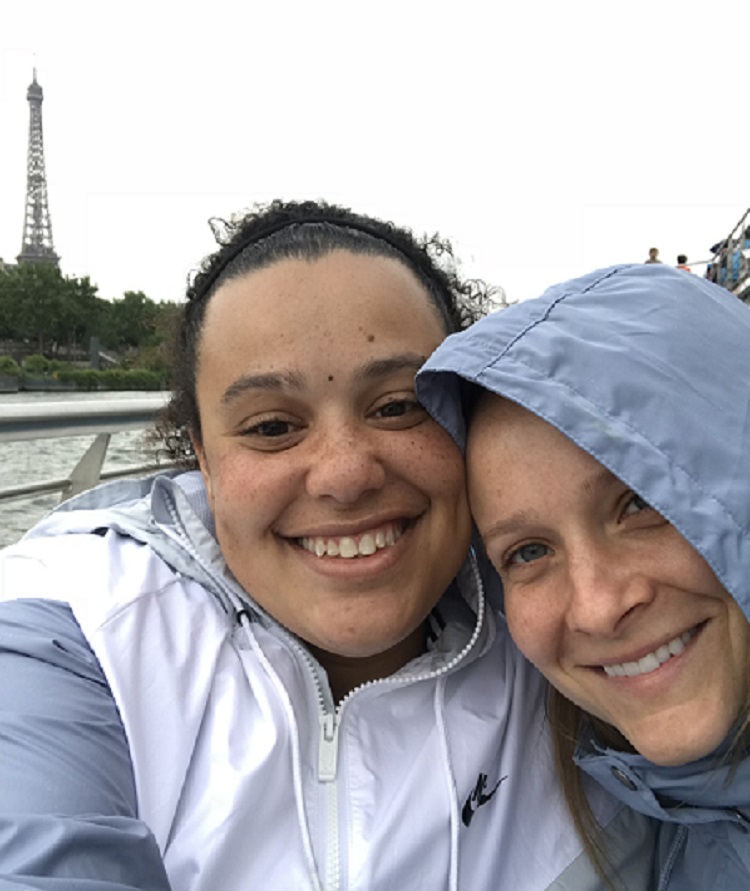
Immigration, Love, and Gayness in Paris
Day One:
“It’s not the French who are anti-Semitic.” This is Julien, my colleague and new Parisian friend. We’re at Les Éditeurs in the Latin Quarter, a café where many writers have allegedly signed fresh book deals. Nine people, many bottles of wine, and a few moody candles grace our table.
“Who is anti-Semitic then?” I ask—legit curious.
He glances behind him at a table with a black man and woman, bites his lower lip, and leans across the professor next to me to whisper loudly, “the immigrants,” like it stung coming out of his mouth.
This is my first time in Paris.
I’m here on a work trip, and I brought my fiancé, Rachel, with me.
Although Rachel and I love to explore new places—we met on the back of a bus in Israel—I have trepidation each time we go someplace new because I wonder where on the scale of Lake Tahoe to Provincetown each place will fall. Lake Tahoe is the place where a teenage girl looked back at us three times—apparently she had never seen a gay couple, let alone an interracial one; Provincetown is where we’re getting married this fall, where our wedding planner told us it seems “strange” when straight couples get hitched there.
I’ve heard that égalité is a cornerstone value of the French people, which made me cautiously optimistic about our trip to France. But I still boarded our WOW Airlines flight wondering if Parisians would stare when Rachel and I held hands. (Not that Rachel seemed to enjoy holding hands very much…I was always the one grabbing for hers, defiant against incoming gazes.)
~
Day Two:
After my presentation at the French Senate, I came back to our hotel in Les Halles. Dusk meandered into our little room and Rachel was on the bed watching CNN, as she had been for hours.
President Trump had just moved the American Embassy from Jerusalem to Tel Aviv. Palestinians were throwing burning tires across the border; Israeli snippers were shooting back into black smoke, killing.
We freshened up and wandered out into the Parisian spring, looking for dinner. Kids screamed, running through misty fountains in Nelson Mandela Park. Women licked creamy gelato along their evening commute.
Sitting in a touristy café on the Rue Montorgueil, on a night where the temperature was so perfect we didn’t notice the temperature, I felt my shoulders loosen with each gay couple that walked down the cobblestone street holding hands. My breath deepened with each pair of interracial partners strolling by.
Maybe Paris was a place where Rachel and I could belong, or at least not be stared at.
~
Day Three:
“Is this a nice place? My friend told me to go there.” My Lonely Planet map is out and I’m making friendly conversation at another Parisian business meeting, pointing to the Canal Saint-Martin area in northeast Paris. I had heard it is the up-and-coming neighborhood, which is my favorite kind.
“Ooohhhhh,” she said, her hazel eyes widening.
I had a feeling I knew the answer.
“Um, that neighborhood has history, but you may want to be careful there.”
“Don’t go there at night?” I asked, trying to show her I got it.
“Well, there are a lot of immigrants there.”
That word again—stinging.
I was starting to feel like maybe I wasn’t the odd one out in Paris.
~
Day Four:
As we followed our tour group to the Eiffel Tower in chilly drizzles, Rachel reached out, grabbed my hand, and held on for a long time. Her palm center was warm. Maybe she was caught up in the romance of Paris; maybe she was starting to feel welcome too.
From the tower’s second floor, I let my eyes wander across newly sprouted leaves and watched the greenish Siene flow by, wondering if it existed before people sliced up the land, creating borders.
I wondered about the different kinds of borders we create—around our hearts, and between genders, races, and “countries of origin.”
Longing to belong is a defining characteristic of the human experience. It’s something we all share, and something that can cause aching in our hearts.
It’s meaningful to me that as a gay woman I feel comfortable, and even welcomed, in Paris. But I’m left wondering if me belonging necessitates that someone else doesn’t.
Is it possible for everyone to belong, or does oneness negate the existence of membership?
Maybe part of the reason that the French (and American and Israeli) people are so focused on the idea of an “other” is because they’re grappling to define themselves.
Maybe we create borders not only to keep others out, but also to keep ourselves in, so that we can have a place in which we feel like we belong.
~
Day Five:
Our last night in France.
I gaze at my gorgeous Black and Jewish fiancé across silky ratatouille and a pot of rich, bubbling fondue.
“How do you feel about what’s happening in Israel?” I ask.
“Sad,” she says. “They’re using too much force.”
~








Read 6 comments and reply